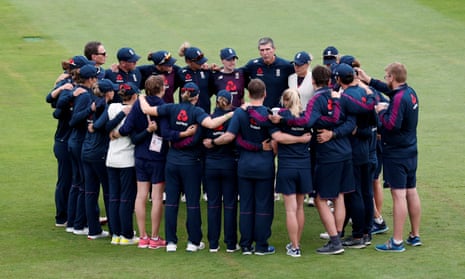The first casualty of England’s disastrous Women’s Ashes series against Australia, which they lost 12 points to four, was revealed on Tuesday: the coach, Mark Robinson. After four years at the helm, in which he won the World Cup and as recently as November led his side to the final of a World Twenty20, the ECB has apparently decided it no longer requires his services.
“After discussions with Mark, we have agreed that now is the right time for him to step down as England Women’s head coach,” said the ECB director of women’s cricket, Clare Connor. “It is important that we give Mark’s successor time to shape the team’s future direction and to begin to develop strong relationships with the players as we plan for the next phase of our international calendar.”
The decision, made by Connor and her colleagues as part of the official post-series review that began after the last match at Bristol on 31 July, is understood to have come as a shock to Robinson and the England players, who had to be hastily informed of the coach’s departure as they came off the field – the press release having been issued while Kia Super League matches were ongoing at Guildford and Bristol.
Robinson will look back on a reign that began with controversy – his decision to drop the captain, Charlotte Edwards – but he led England to their first World Cup win in almost a decade.
Along the way he transformed the careers of a number of players, most notably Tammy Beaumont, who averaged nine in one-day international cricket before his appointment but was named player of the tournament at the 2017 World Cup, and hit a century against Australia this summer. Beaumont attributes her success to the unshakable belief shown in her by Robinson: “I saw it as a second chance,” she once said. “He came in as coach and saw something in me.”
Even during this last difficult summer, when he has come under criticism for his refusal to blood new players in the face of heavy defeats, Robinson has stubbornly retained that faith in his core group. “We’ve got these players, we’ve invested in them,” he said after the Ashes were lost at Taunton. “I believe in them.”
It is that belief that has been his great strength as coach and driven his endless quest for more resources throughout his time at the helm: pushing for the introduction of “Rookie” contracts and for reforms to the domestic structure, which is completely amateur and severely under-resourced.
The sad fact is Robinson appears to have been made a convenient scapegoat for a series defeat that stemmed from the failure of his superiors at the ECB to invest more fully in the women’s game.
Whoever succeeds him will have a tough act to follow. For the moment the assistant coach, Ali Maiden, will take charge, but the ECB will presumably want someone else to be in place by the time England play Pakistan in December, to give them time to find their feet ahead of the next World Twenty20 in February. The former Test player Chris Adams, whose daughter Georgia represents Sussex and Loughborough Lightning, was runner-up to Robinson last time around; and may well throw his hat into the ring again on that basis.
Before appointing Robinson, Connor was explicit that “there are no female coaches in cricket out there who have the skills, experiences and the proven track record to be in this role”. Should the ECB look to be more progressive this time, the former Australia international and current head coach of USA Women, Julia Price, as well as Salliann Briggs, the former Loughborough coach currently working in Tasmania, are possible candidates.
It is not out of the question that Edwards, who is known to have ambitions to coach an international side, may also put her name forward; there is perhaps no one else out there who understands quite so well the pressures of the contemporary women’s game.
First, though, the post-Ashes series review needs to be concluded and it is expected to last several more weeks. It may be that more upheaval is forthcoming before the business of installing a new regime can commence.

Comments (…)
Sign in or create your Guardian account to join the discussion